- Home
- Jennifer Moore
Solving Sophronia (The Blue Orchid Society, #1) Page 3
Solving Sophronia (The Blue Orchid Society, #1) Read online
Page 3
Jonathan waved for the sergeant to retain the satchel. “Suppose so.” He glanced at his pocket watch, then raised his brows and gave a small smirk of his own. “Pity we apprehended them so early. Left ourselves time to write up the reports.”
“Congratulations, sir,” Sergeant Lester said, and his mouth spread into a genuine smile. “Nice bit of detective work.”
The praise made Jonathan uncomfortable, but he shrugged it off, looking away across the street and rubbing the pocket watch fob between his fingers. “It was a group effort, Sergeant. All of the men contributed.” He motioned with his chin in the direction the prisoner wagon had gone. “Even Mr. Wardle and Mr. Marley contributed—unintentionally, of course. Only a matter of time before a criminal makes a mistake; that, you can count on.”
Sergeant Lester laughed. “You’re being modest, if you don’t mind me saying so, sir. Poor blokes had no way o’ knowing you’d investigate them so thoroughly. And I’ll not soon be forgetting the look on their faces when we stormed the passenger carriage.”
“Their disguises really were terrible, weren’t they?” Jonathan grinned.
Beside them, Constable Merryweather snorted.
Jonathan watched the street traffic for a moment longer, then gave a sharp nod. “Right, then.” He motioned to another of the constables. “Constable Hutchings, we’ll be needing two hackney cabs, if you please. Direct them to wait. You others, be on your guard.” He motioned to the satchel in the sergeant’s hands. “I’m not interested in hunting down this bag a second time.”
Seeing the men’s acknowledging nods, Jonathan crossed Praed Street to a vendor and purchased a bag of tarts. The small gesture was by no means adequate compensation for his comrades’ work on this case, but he wished to express his gratitude all the same. One solved theft hardly made a dent in London’s crime situation, but it was still commendable, and he wanted the men to have a moment of celebration.
An hour later Jonathan stepped through the door of the H Division station and removed his hat.
Bert Abner, the desk sergeant, glanced up. “Detective Graham, I’ve some mail for you.” He pulled a pile of envelopes from a compartment and reached forward to hand the bundle over the tall desk.
“Thank you, Sergeant.”
Sergeant Abner grinned, showing missing teeth beneath an enormous red mustache. “Been an exciting day, sir.” He chuckled. “Appreciated the package ye sent.”
Jonathan smiled at the reference to the jewel thieves in their ridiculous disguises. Sergeant Abner had no doubt signed them in only moments earlier. “Thought you’d enjoy that.” He leaned an arm on the tall desk beside the sergeant’s penny-dreadful novel.
“The wig . . .” Abner chuckled again, the sound growing into a full belly laugh that had the man holding his sides. “And the lady’s gown with the”—he waved his hands in front of his chest—“the cotton padding. Wish we’d a photography camera here at the station.” He wiped his eyes. “There’s a photograph I’d keep framed on me mantel.”
The constables in the main room of the station laughed at this.
As Jonathan glanced through the letters, he chuckled as well, but he couldn’t help thinking how beneficial photographs of criminals would actually be. There were often repeat offenders, and to easily identify them . . .
Seeing Constable Merryweather walk past, Jonathan was pulled from his thoughts. “Constable, I do hope you’re headed for home.”
The young man clasped his hands behind his back. “I’m on duty in an hour, sir.”
“Nonsense,” Jonathan said. “You haven’t had a wink of sleep in a day and a half.”
Merryweather shrugged. “If I might be so bold, sir, you’ve not slept either.”
“That is entirely different,” Jonathan said. “I don’t have to walk a four-mile beat for the next—”
The station door opened, and a boy ran inside. “Come quick! There’s been a murder!”
“What’s all this?” Sergeant Abner scowled and leaned over the tall counter, pointing. “You, there. Boy! I will tolerate no yelling in the station house.”
The boy breathed heavily, and his cheeks were flushed. He’d no doubt been running. “But sir—”
Jonathan set the letters back on the reception desk and approached the boy. “Now then, calm yourself. What’s your name, lad?”
“Freddy Payne, sir. Constable Hutchings sent me. Said to fetch Detective Graham right away.”
“I’m Detective Graham.” He clasped his hands behind his back. “What’s this about a murder?”
“A woman, sir, in a blue dress. She’s dead in an alley off Wentworth. Behind the Porky Pie.”
Spitalfields, of course. Jonathan glanced through the station’s window; the summer evening was still light—at least for the next hour. Extreme poverty, disease, overcrowding, and crime made Spitalfields one of the most dangerous slums in the city. An ideal place for criminals to disappear, Spitalfields was a complicated warren of dark alleys and crumbling buildings. Pubs, bawdy houses, and opium dens were the primary businesses of the rookery, and in the interest of safety, police walked the street in pairs. Not that any of these concerns gave him a moment’s hesitation. He was an officer of the law, after all. “Well, then.” Jonathan put on his hat. “Off we go.”
He motioned with a flick of his head for Sergeant Lester to follow.
“If I might accompany you as well, Detective”—Merryweather hurried toward them, bucket hat underneath his arm—“the Porky Pie is on my beat.”
Jonathan nodded. He glanced up again when the group stepped outside. The fog was thickening into dark clouds. They would need to hurry before rain washed away evidence or the night became too dark to investigate properly. Poorly maintained streets and late-afternoon traffic would make the journey much quicker on foot.
“Lead the way, Freddy.”
The boy planted his feet, fists on his hips. He scowled, lifting his chin defiantly. “I was sent to find one copper. Escortin’ the three of ye’ll raise the price.”
Sergeant Lester opened his mouth to argue, but Jonathan tossed the boy a penny. “You’ll get another when we reach the Porky Pie.”
“Yes, sir!” Freddy grinned and tucked the coin into a pocket, then set off at a quick pace.
The men followed.
Jonathan smirked at the boy. Creative, he’d give him that. And cheeky. The Porky Pie was easy enough to find, with or without Freddy’s help, but Jonathan would not begrudge the lad. Based on where the boy’d come from and the way his clothes hung loosely on his small frame, he knew a penny meant one less day with an empty stomach. Jonathan had felt childhood hunger pains firsthand.
As they all walked, Merryweather caught up to the boy, his long strides keeping time with Freddy’s short ones. “You look familiar, Freddy. Payne, did you say?”
“Yes, sir.”
“I’ve come across a Martha Payne a time or two on my beat. Works as a laundress. You know her?”
Freddy’s small shoulders stiffened. “My mum never committed any crime.”
“No, I apologize. That’s not what I meant. Try to learn the names of all the people on my beat, I do. You’ve a good mum.”
Jonathan wondered what it was about the woman that made Merryweather remember her. He hoped the circumstance was as innocent as the man had said, but he feared the odds of that were low. Hunger drove the most honest of people to breaking the law, and the woman had a child to feed.
A crowd had gathered outside the alley beside the Porky Pie, with constables holding the curious gawkers back from the crime scene.
As promised, Jonathan gave Freddy another penny.
Constable Hutchings met them at the edge of the gathering, falling into step beside Jonathan. “A young woman, sir. No blood. Best guest is she was strangled.”
“We won’t know for certain until Dr. Peabody i
nspects the remains,” Jonathan said. “You’ve preserved the scene?”
“She’s not been touched since we arrived, other than to check for a pulse,” Hutchings said. “But there’s no telling who might have been here before we were called.”
“Keep an eye on the people, Merryweather,” Jonathan said. “Watch for anyone acting unusual.”
“Yes, sir.” The constable broke off from the others and began making his way among the gathered citizens.
Jonathan and Sergeant Lester followed Hutchings to the mouth of the alley, the other constables making a path through the crowd. Jonathan glanced around for Freddy, wanting to ask the lad a few questions, but as soon as he’d gotten the coin in his hand, the boy had made himself scarce. Jonathan didn’t blame him. It wouldn’t improve Freddy’s reputation to be the one bringing the police into his neighborhood.
Nightfall was approaching quickly, and the narrow alley was already cast in shadow. The nearest gas lamp was half a block away. Jonathan blinked, waiting for his eyesight to adjust. Even if it hadn’t been evening, this area of the city was always dim beneath a layer of smoke. “Fetch some lanterns, Hutchings.”
“Yes, sir.”
Jonathan took another peppermint from his pocket and sucked on it as he surveyed the scene. Placing his feet carefully, he studied the ground as he stepped toward the body in the blue dress. The paving stones were uneven, and quite a few were broken or missing. Searching for footprints would be pointless.
The victim lay on her front, head turned to the side. One arm was beneath her body, and the other was outstretched above her head. Her hair had come partially unfastened and spread on the ground in a mess of blonde curls.
Jonathan tugged up on the pleats of his trousers and crouched down to examine the body closer. “What do you see, Sergeant?”
“Appears to be in her twenties, sir.” Sergeant Lester moved the woman’s collar. Even in the dim light, bruising was visible on her neck. “I’d say Hutchings is right. Looks like she was throttled.”
Whether or not that was the cause of death was still to be seen. When the lanterns arrived, he could possibly discern more clues from the body. Jonathan stood and took note of the alleyway—one entrance from the street and, at the other end, a brick wall too high to climb. When he kicked aside a broken bottle, a cat dodged past, no doubt in pursuit of vermin of some kind. Pieces of crates and other rubbish littered the space, giving the air a foul odor and contributing to the rodent problem. A door on his left led into the Porky Pie, and above, on either side, were windows of upper stories from which lines of drying clothes were strung over the alley. He wondered vaguely if their owners would pull them inside before the rain started.
He tried the door handle. Locked.
Circles of light spread through the alley as Hutchings returned with two lanterns.
Sergeant Lester took one, and Jonathan the other. “Ask around inside the pub, Constable,” Jonathan said to Hutchings. “Learn who has a key to this door and whether anyone noted anything suspicious.”
“Yes, sir.” The constable started away.
“Do you think the killer escaped through the pub?” Sergeant Lester asked. He tried the door handle as well, with the same result.
“If so, he either had a key or was assisted by someone inside.”
Raised voices came from the crowd, Merryweather’s among them. Jonathan shared a look with the sergeant, and they strode to the mouth of the alley to investigate.
“Let me through, sir.” A young woman was attempting to push past the constable. “I insist you move aside directly.”
Jonathan brought the lantern light closer. The woman was short with light-brown hair pulled up beneath a flower-embellished hat. Her skirt was striped, and she wore a matching fitted jacket over a blouse with a lace collar. A brooch with some sort of blue flower was pinned to her lapel. But the most conspicuous characteristic was the woman’s cleanliness. Her clothing was laundered and her shoes unblemished. It was obvious the garments were costly, even to a person with no knowledge of fashion. Her appearance stood out like a beacon in the grimy street.
“I’ll handle this, Constable,” Jonathan said. He turned to the woman and tugged on his hat brim. “Detective Jonathan Graham, at your service, miss.”
“Sophie Bremerton.” She inclined her head.
“How might I be of assistance, Miss Bremerton?”
“Thank you, Detective.” She darted a sharp look at the constable. “This man refuses to let me past.”
Jonathan glanced at Merryweather, then back at her. “With good reason, miss. This is an active crime scene.”
“Yes, I realize that, Detective. It is the very reason I’m here.”
In just that moment Jonathan took her measure. She was confident and well-spoken, with an aristocratic accent. The woman was no doubt slumming—a favorite pastime of the privileged and bored. Curious wealthy tourists visited impoverished neighborhoods for amusement. The idea of these people seeking a thrill from witnessing the hardships of their fellow man made Jonathan’s blood boil.
Very well, he’d teach this Sophie Bremerton a lesson. Show her the people he protected were not simply here for her entertainment.
“Stand aside, Merryweather.” He took Miss Bremerton’s elbow and pulled her into the alley with long strides, holding up the lantern so the body on the ground was completely illuminated.
Miss Bremerton cringed back. “Oh my. Do you know her name?”
“No.”
“She’s so young.”
“Was young,” Jonathan said, satisfied that the interloper had gotten more than she’d asked for. “So tell me, Miss Bremerton, is this what you hoped to see? Is it tragic enough for . . .” His words trailed off when he realized she was not listening but had stepped away and begun to speak with Sergeant Lester. Jonathan scowled and followed her.
“A pleasure to meet you, Sergeant,” she was saying. “What do you suppose happened to this poor woman?”
Sergeant Lester knelt, set down his lantern, and pulled back the dead woman’s collar.
Miss Bremerton knelt on the other side of the body, arranging her skirts around her and then leaning close to study the woman’s neck. “She was strangled,” she said.
“That’s our guess, miss,” Sergeant Lester said. “The doctor will know for certain.”
“How terrible.” Miss Bremerton’s voice was much softer. It seemed she finally understood this was not simply a carnival show but a life cut short in a violent manner.
“Yes,” Jonathan said, coming to stand behind her, glad the exercise had had its intended effect. “It is, as I told you, a crime scene—a murder scene. Of course it is not pleasant. Now, if you’re quite done . . .” He reached out a hand to assist her to rise.
Sophie Bremerton apparently suffered from convenient hearing loss. She didn’t even glance up as Jonathan spoke, but tipped her head to the side, looking at the body. “She didn’t intend to go out of doors, I think. She wears no hat nor gloves.”
“They may have been stolen,” Sergeant Lester said.
“But not her ring?” Miss Bremerton pointed to the silver band on the woman’s finger. “I do not think it is very valuable, but it is surely more so than a pair of gloves.”
“Perhaps the thief did not see it in the dim light,” Jonathan said. “At this point, we can’t rule out any possibilities. Now, if you please . . .” He held out his hand again, but as before, she ignored him.
“The gown is very distinctive,” she said. “Custom-made raw silk with Brussels lace.” She sat back on her heels. “But it was not sewn for this woman.”
“How do you know that?” Jonathan asked, curious in spite of his irritation.
“The sleeves are too short.” Miss Bremerton pointed to the woman’s wrists. “And of course the tournure is all wrong for this skirt.”
Serg
eant Lester looked up at the detective with a confused expression that Jonathan was certain matched his own.
“Tournure, miss?” the sergeant asked.
“The bustle,” Miss Bremerton said.
Sergeant Lester furrowed his brows. “You mean the contraption that makes a hump on a lady’s bum?”
Miss Bremerton nodded. “I suppose that’s as good a description as any.” Her voice trembled the slightest bit, and Jonathan thought she might be holding back a laugh.
“And how can you tell she was wearing the wrong bustle?” Jonathan asked, wanting to return the conversation to the business of solving the murder.
“You see, here.” She pointed to the bottom ruffle of the woman’s dress. “The rear of her skirts have been dragging. The proper tournure would have lifted the hem off the ground.”
“So we can assume the woman purchased the gown secondhand, without the proper underclothing,” Jonathan said. “While it is interesting, it is not unusual.”
“I agree, Detective,” Miss Bremerton said. “But a dress such as this . . . its value is very dear. I believe it was made for last year’s Season. The collar design and color were the very height of fashion, and the basque-style overskirt had not yet been replaced by a polonaise.”
The men shared another bewildered look.
Miss Bremerton continued. “If we can discern where the dress is from or how she came to be wearing it, perhaps it would lead to her identity.”
Jonathan didn’t like the woman’s use of the word we or the way she was taking charge of the investigation. “Obviously, that is—what are you doing now?”
Miss Bremerton had pulled a notebook from her bag and started sketching. “It will be dark soon, Detective. And it looks like rain. I intend to document as much of the scene as possible. Would you move your lantern closer?”
Jonathan plunked down his lantern beside Sergeant Lester’s in front of the lady. His irritation was evolving into something much more like anger. He’d had quite enough of this woman’s presumptions and uninvited observations and intended to tell her. But before he had the chance, Sergeant Lester called to him. “Sir, have a look at this.” He motioned him toward the victim’s feet. “The backs of her heels are scraped.”

 Charlotte's Promise
Charlotte's Promise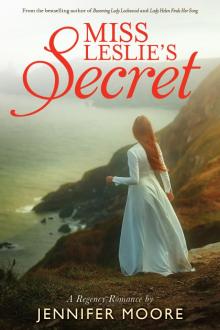 Miss Leslie's Secret
Miss Leslie's Secret My Dearest Enemy
My Dearest Enemy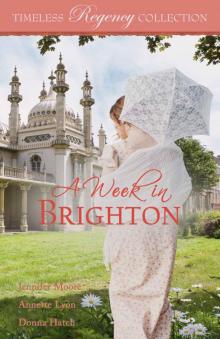 A Week in Brighton (Timeless Regency Collection Book 13)
A Week in Brighton (Timeless Regency Collection Book 13)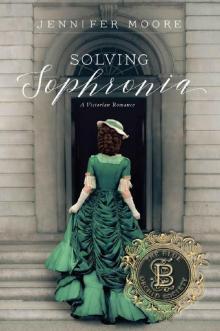 Solving Sophronia (The Blue Orchid Society, #1)
Solving Sophronia (The Blue Orchid Society, #1)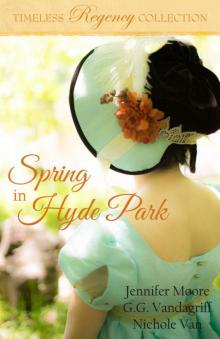 Spring in Hyde Park
Spring in Hyde Park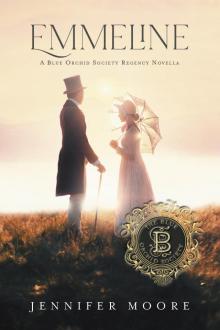 Emmeline
Emmeline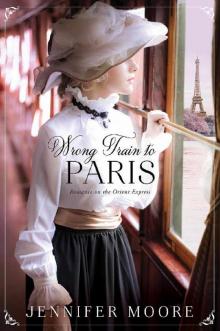 Wrong Train to Paris (Romance on the Orient Express, #2)
Wrong Train to Paris (Romance on the Orient Express, #2)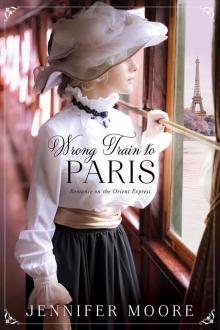 Wrong Train to Paris
Wrong Train to Paris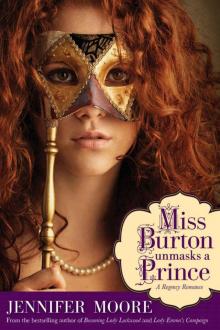 Miss Burton Unmasks a Prince
Miss Burton Unmasks a Prince Safe Harbor
Safe Harbor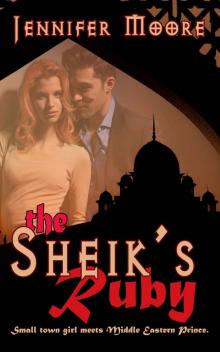 The Sheik's Ruby
The Sheik's Ruby Change of Heart
Change of Heart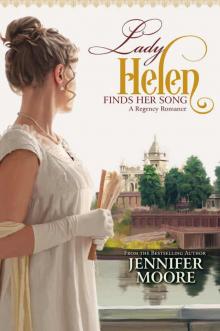 Lady Helen Finds Her Song
Lady Helen Finds Her Song Simply Anna
Simply Anna